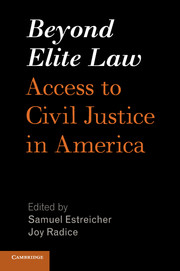Book contents
- Frontmatter
- Contents
- Beyond Elite Law
- Foreword
- List of Contributors
- Overview
- Overview
- PART I CURRENT STATE OF ACCESS TO LEGAL SERVICES
- PART II SOURCES OF LEGAL SERVICES ASSISTANCE FOR WORKING AMERICANS
- PART III FASHIONING A REFORM AGENDA
- 23 New York State Task Force to Expand Access to Civil Legal Services
- 24 New York's 50-hour Pro Bono Requirement
- 25 Starting a “Low Bono” Law Practice
- 26 Toward a More Effective and Accessible Solo and Small Firm Practice Model
- 27 Facilitating Homemade Wills
- 28 Court Facilitation of Self-Representation
- 29 Limited Representation and Ethical Challenges
- 30 Technology Can Solve Much of America's Access to Justice Problem, If We Let It
- 31 Mediation of Employment Disputes at the EEOC
- 32 AAA Consumer Arbitration
- 33 Saturns for Rickshaws: Lessons for Consumer Arbitration and Access to Justice
- 34 Employment Arbitration in the Securities Industry
- 35 FINRA Arbitration and Employment Disputes
- 36 Arbitration as an Employee-Friendly Forum
- 37 Access to Justice in Employment Arbitration: a Critical Look
- 38 Collaborative Technology Improves Access to Justice
- 39 Union Representation in Employment Arbitration
- 40 Legal Representation for New York City's Chinese Immigrant Workers
- 41 Reassessing Unauthorized Practice of Law Rules
- 42 The Pyett Protocol: Collectively-Bargained Grievance Arbitration as a Forum for Individual Statutory Employment Claims
- PART IV CREATING A CULTURE OF SERVICE
- Index
41 - Reassessing Unauthorized Practice of Law Rules
from PART III - FASHIONING A REFORM AGENDA
Published online by Cambridge University Press: 05 May 2016
- Frontmatter
- Contents
- Beyond Elite Law
- Foreword
- List of Contributors
- Overview
- Overview
- PART I CURRENT STATE OF ACCESS TO LEGAL SERVICES
- PART II SOURCES OF LEGAL SERVICES ASSISTANCE FOR WORKING AMERICANS
- PART III FASHIONING A REFORM AGENDA
- 23 New York State Task Force to Expand Access to Civil Legal Services
- 24 New York's 50-hour Pro Bono Requirement
- 25 Starting a “Low Bono” Law Practice
- 26 Toward a More Effective and Accessible Solo and Small Firm Practice Model
- 27 Facilitating Homemade Wills
- 28 Court Facilitation of Self-Representation
- 29 Limited Representation and Ethical Challenges
- 30 Technology Can Solve Much of America's Access to Justice Problem, If We Let It
- 31 Mediation of Employment Disputes at the EEOC
- 32 AAA Consumer Arbitration
- 33 Saturns for Rickshaws: Lessons for Consumer Arbitration and Access to Justice
- 34 Employment Arbitration in the Securities Industry
- 35 FINRA Arbitration and Employment Disputes
- 36 Arbitration as an Employee-Friendly Forum
- 37 Access to Justice in Employment Arbitration: a Critical Look
- 38 Collaborative Technology Improves Access to Justice
- 39 Union Representation in Employment Arbitration
- 40 Legal Representation for New York City's Chinese Immigrant Workers
- 41 Reassessing Unauthorized Practice of Law Rules
- 42 The Pyett Protocol: Collectively-Bargained Grievance Arbitration as a Forum for Individual Statutory Employment Claims
- PART IV CREATING A CULTURE OF SERVICE
- Index
Summary
It is a widespread finding of the access-to-legal services literature that representation by a lawyer is unlikely ever to be provided for all Americans who need legal services and are unable to pay for it. This suggests there should a greater receptivity in the legal profession to representation by non-lawyers and enhancement of aids for self-representation. Kate Levine explores in this chapter how state laws prohibiting the “unauthorized practice of law” remain a significant barrier to needed experimentation and reform.
One would think that if poor and middle-income people cannot afford an attorney, they should have an option to obtain representation either from a non-lawyer who, by reason of experience or self-study, has practical expertise in a given area, or from a cost-efficient online form-preparation service. As a formal legal matter, however, those without a license to practice law in a particular jurisdiction are often barred by “unauthorized practice of law” (UPL) statutes or court rules from giving advice or representing individuals in legal matters in a whole host of situations. Notwithstanding evidence that the public desires, and in many cases would benefit from, such informal solutions, successful experience with lay representation before administrative agencies, and the fact that many people, often by necessity, must represent themselves in court proceedings, the organized bar prohibits any incursion into legal practice (as defined by the bar) by laypersons. UPL rules, which exist in every state, are most often enforced not by the executive branch or by private citizens claiming harm, but by state bar committees. The problems inherent in lawyers regulating their own competition are obvious and well documented. Yet these laws remain on the books and are actively enforced in most states.
UPL STATUTES AND ATTEMPTS TO DEFINE THE “PRACTICE OF LAW”
Many of the UPL statutes fail to offer a clear definition of the “practice of law.” Some jurisdictions offer no statutory or rule-based definition at all, relying on the courts to define the practice of law on a case-by-case basis, and essentially allow the state bar to control which practices are regulated through selective enforcement.
- Type
- Chapter
- Information
- Beyond Elite LawAccess to Civil Justice in America, pp. 581 - 606Publisher: Cambridge University PressPrint publication year: 2016



